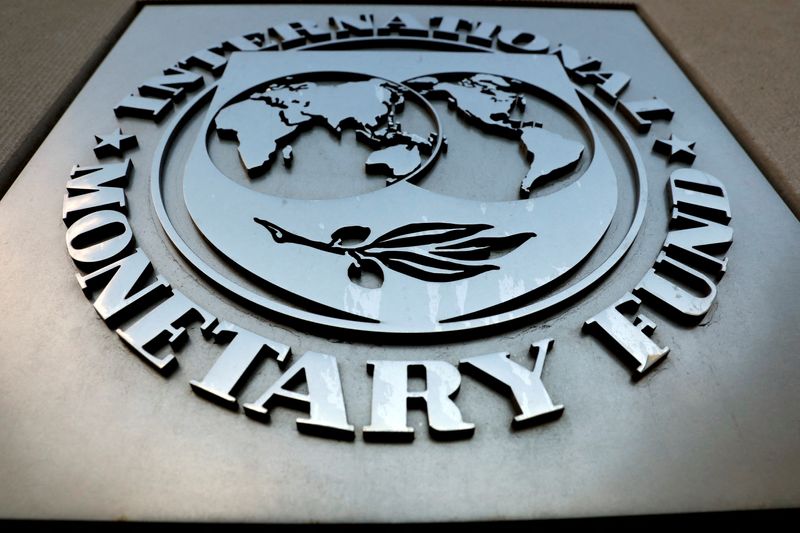By David Lawder and Andrea Shalal
WASHINGTON (Reuters) - Amid the devastation of World War Two, the United States and its allies created the institutions that have governed the post-war global economic order, focused on rebuilding Europe, fighting poverty and bringing rivals together to work out trade disputes peacefully.
But as the first major European war since 1945 rages, some Western countries are discussing strategies to oust Russia from the International Monetary Fund (IMF), the World Trade Organization (WTO), the World Bank and other development lenders as punishment for its invasion of Ukraine.
If successful, such moves would reverse a decades-old doctrine that engaging former communist states in these institutions produces better outcomes than shunning them. But some officials and diplomats say that Russia's actions in Ukraine are so abhorrent that Moscow no longer deserves to help shape global economic development.
Russia insists it is engaging in a "special operation" in Ukraine.
Here are the main efforts to eject or suspend Russia from major institutions designed for a world at peace and without clear mechanisms for punishing combatants.
IMF
Some European Union officials are examining ways to curb Russia's influence at the global crisis lender, which the Soviet Union helped create but never joined after World War Two.
Both Russia and Ukraine joined the IMF in 1992, a year after the Soviet Union collapsed.
The IMF's Articles of Agreement https://www.imf.org/external/pubs/ft/aa/pdf/aa.pdf contain no provisions regarding armed conflicts, which many members have launched in the past, including the United States.
A process for expelling Russia would require a finding that Moscow violated the Articles, such as failing to furnish the IMF with required economic data on reserve assets, balance of payments, trade and foreign exchange operations.
If a violation were found and not corrected, members holding 70% of the IMF's voting power after "a reasonable period" could suspend Russia's voting rights. After another "reasonable period," an 85% voting majority could force the country to withdraw from Fund membership.
In a more symbolic but easier move, Western governments could strip Russian Executive Director Aleksei Mozhin of his honorary title as dean of the IMF's Executive Board. The informal role as that board's most senior director carries little power other than chairing board meetings in the absence of the IMF's managing director.
WTO
The United States and its European allies are also examining ways to suspend Russia's "most favored nation" trade status, which would allow them to impose tariffs well above global rates they have pledged to all WTO members.
Under U.S. law, revoking Russia's trade status would require an act of Congress. However, a budget bill and legislation to ban Russian energy imports, which are slated for votes on Friday, excluded a provision to revoke permanent normal trade relations with Russia. Instead, the legislation authorizes a review of Russia's WTO membership.
Expelling Russia, which joined the WTO in 2012 after 19 years of negotiations, would be extremely difficult as there is no specific expulsion process. The WTO would need a two-thirds majority to create such a process and a three-fourths majority to remove Russia. But the body typically reaches decisions by consensus among its 164 member countries - a non-voting structure that has largely stymied significant changes for decades.
There is a better chance of denying Russian ally Belarus' bid to join the WTO, a process that has languished in negotiations since 1993. Western nations have accused Belarus of facilitating the invasion of Ukraine.
WORLD BANK GROUP
The World Bank last week halted all of its program work in Russia and Belarus over the invasion of Ukraine. Russia and Ukraine both joined the global lender in 1992.
The move stops disbursements to Belarus on active loan projects https://financesapp.worldbank.org/countries/Belarus totaling some $511 million through 2025 and loan commitments to Belarus for its emergency COVID-19 response.
The last World Bank loan to Russia was approved in 2013, before Moscow's annexation of the Crimea region in 2014, but the lender paid out $3.6 million in December 2021 for a meteorological project.
If Russia were to fail to meet its obligations in the World Bank's Articles of Agreement https://thedocs.worldbank.org/en/doc/722361541184234501-0330022018/original/IBRDArticlesOfAgreementEnglish.pdf, a voting majority of shareholders could suspend Moscow's membership, a move that would result in automatic membership termination if not reversed within a year.
EUROPEAN BANK FOR RECONSTRUCTION AND DEVELOPMENT
The European Bank for Reconstruction and Development (EBRD), launched in 1991 to support former communist countries in Eastern Europe, said on March 1 that its board of directors voted "in large numbers" to suspend Russia and Belarus indefinitely from access to its financing.

The EBRD's governors now have 30 days to vote on the proposal, which requires a two-thirds majority to pass.
The organization had already stopped investing in Russia after the Crimea annexation and imposed a moratorium on new investment in Belarus following that country's disputed 2020 election.